Washing laundry isn’t something we spend much time thinking about on a day to day basis beyond “we need to do laundry.” If you are a frequent traveler or live off the grid, however, things are suddenly not as simple as throwing clothes into a washing machine and hitting the start button.
One solution to washing laundry on the go or off grid is the Scrubba tactical wash bag. Being able to do your laundry off-grid and on the go is as important as knowing how to shower off-grid.
When we travel I always like to pack as light as possible. That means fewer clothes. If there is laundry at our rental that makes life easier, but it’s not always the case. I’ve had to wash clothes by hand in a sink before, but it’s only so effective. The Scrubba wash bag is a better solution.
- FAST & CONVENIENT: The patented washboard-in-a-bag design gives a machine quality wash in just minutes and you can wash anywhere – perfect for deployments, hotels, hostels, camping, backpacking, dorm rooms, RVs and scout trips.
- SO SMALL AND LIGHT: Weighing just 5.6 oz. and folding to pocket-size, this world’s smallest washing machine takes up no space and lets you travel clean, light and free.
The use case is obvious for digital nomads and frequent travelers looking to travel light and save money, but the Scrubba is also useful to have on hand in a prolonged power outage or larger crisis. You are, in essence, looking for ways to wash laundry off-grid.
Did you know that Romans washed their laundry in urine!? When it comes to off-grid living, there’s a lot that we can learn from history.
Table of Contents
Off Grid Laundry in History
As far as we can tell, the first laundering that was done involved being next to a moving stream, beating your clothing against rocks, and rubbing it with sand. In many parts of the world, this is actually still the practice. Excavations have revealed that the ancient Babylonians used soap circa 2800 BC. Though this doesn’t mean that soap wasn’t used before that time, this is the earliest record we have of its use in history.
Pharaohs’ Egyptians and the Chinese during the Zhou dynasty also used primitive forms of soap. The Egyptians used a mixture of animal or plant oils with alkaline salt, whereas the Chinese mixed plant ash with crushed seashells in order to remove stains from their clothing. For whatever reason though, around the Mediterranean, soap seemed to be primarily used as a medicine until famed Greek physician Galen suggested it being used for cleaning instead.
Pliny the Elder even recorded soap’s being used for “dispers[ing] scrofulous sores” in his Natural History. It was throughout this entire time that washing bats were quite common. A washing bat is in essence a stick that you use to stir your clothes around while they’re under water. The act of using a washing bat was referred to as “possing.”
It was the Roman empire though that brought soap to newfound fame. The Romans had a preoccupation with personal hygiene, appearance, and cleanliness, and as a result, the importance of soap grew exponentially. They were actually one of the first cultures (that we know of) that had people whose sole occupation was to launder clothes. These people were referred to as “fullers.” They quickly became a mainstay of Roman society dying, washing, and drying clothes for the populace.
Their means of washing clothes though was to collect urine from the public restrooms and then to wash their clothes in that. The reason for such is that urine contains ammonia, and as such can be used as a cleaning agent. I suppose your toga would smell like all your neighbors’ pee, but hey, at least the wine stain was gone.
This usage of urine even continued on into Medieval times as well. Throughout Medieval Europe, pee used for washing clothes was commonly referred to as “chamber lye” from the chamber pot where it was gathered. It was used to dissolve dirt, loosen grease, and bleach yellowing fabrics.
As the population of cities grew however, people had to mover further and further away from the original water source that the city relied on. This resulted in the inability for a great portion of the populace to be able to effectively reach a stream to wash their clothes in. Thus, urbanization brought us more portable means of laundering such as the washbasin and later (thanks to the Scandinavians) the washboard.
- 12-7/16 x 23-3/4 overall^10-7/8 x 11 workspace^Wood frame metal wash surface
Even drying clothes has a bit of history behind it, and the clothesline is something of a modern invention. For a long time, people just laid their clothes out in the grass somewhere for them to dry, or used a bush when such seemed a better option.
Enter the Scrubba Tactical Wash Bag
When I was doing research to write an article about ways to wash laundry while traveling or when the power goes out, I was happy to discover that there was actually a product on the market designed for this very purpose – the Scrubba wash bag. The Scrubba is affordable, compact, and easy to use.
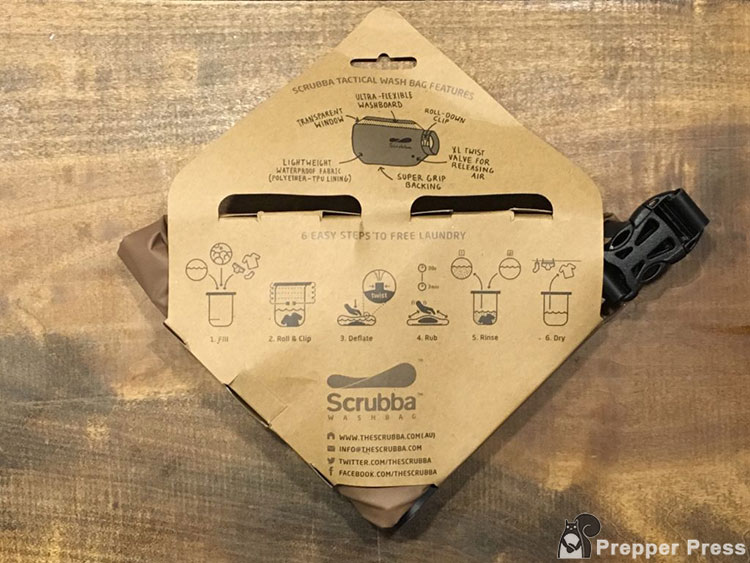
The Scrubba is a little bag that acts as a portable washing machine in a similar manner to a washboard. I think it’s fantastic. If you’re hitting the road in your RV, living as a digital nomad, living off grid, or experiencing a power outage, you’re not going to have access to a conventional washing machine.
The company describes the Scrubba Tactical Wash Bag this way:
The Scrubba wash bag is designed as a modern take on the old- fashioned washboard. It’s made to be ultra-portable, easy to use, and effective. Thanks to the integrated scrubbing nobules, the Scrubba wash bag is twice as effective as hand washing. It folds down to pocket- size, and doubles as a drybag for ultimate convenience. Whether you are camping, traveling, or just hand-washing clothes at home, the Scrubba wash bag helps you to save time, money, and water.
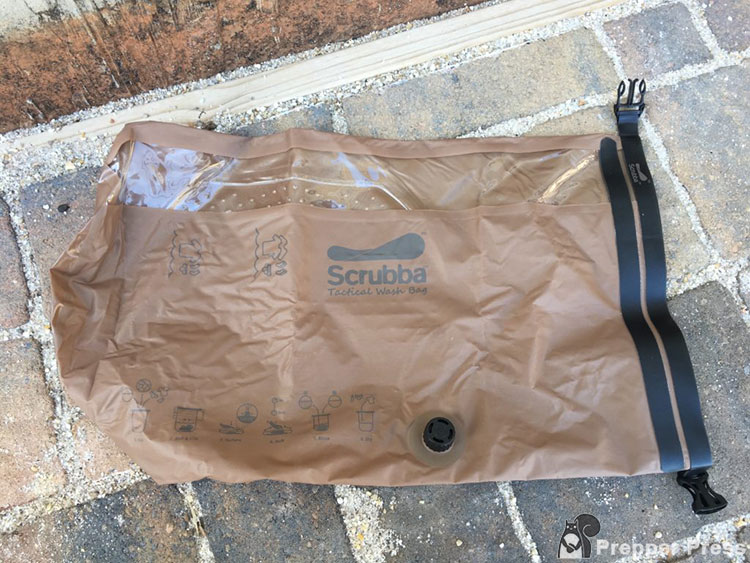
A lot of people think that laundry doesn’t really matter post-disaster, or they don’t give it much thought at all, but the fact of the matter is that it matters a lot. Don’t get me wrong, it’s most certainly not as important as shelter, light, water, food, security, and medical care, but it does matter when we’re talking about post-disaster populations. After the initial catastrophe – whether we’re talking about wildfire, hurricane, tornado, tsunami, or whatever – has passed, the greatest danger is dying from poor hygiene. That’s if we’re looking at statistics on post-disaster populations, anyway.
In fact, the issue of post-crisis cleanliness is so critical it’s been given an acronym: WASH. It stands for Water, Sanitation, and Hygiene.
It’s diseases such as cholera, typhus, and other illnesses associated with poor hygiene that ends up killing people in the aftermath of prolonged, large-scale disaster. Most of these come from eating or drinking food that is somehow contaminated with feces germs. Have water filters to use at home in a crisis!
If you’re regularly trudging through water in which other people have defecated (e.g. post-tsunami), getting these types of germs on your clothing and body is much easier than you would think. As such, you need some way to launder your clothes and to ensure that they are clean.
How to Use a Scrubba
Clean laundry is also a huge morale boost. Walking around for a week in smelly, dirty clothes isn’t good for anybody’s psyche.
This is why I arrived at this article and how I ended up reviewing the Scrubba Tactical Wash Bag. Here is how it works.
Step 1: Get Your Dirty Clothes
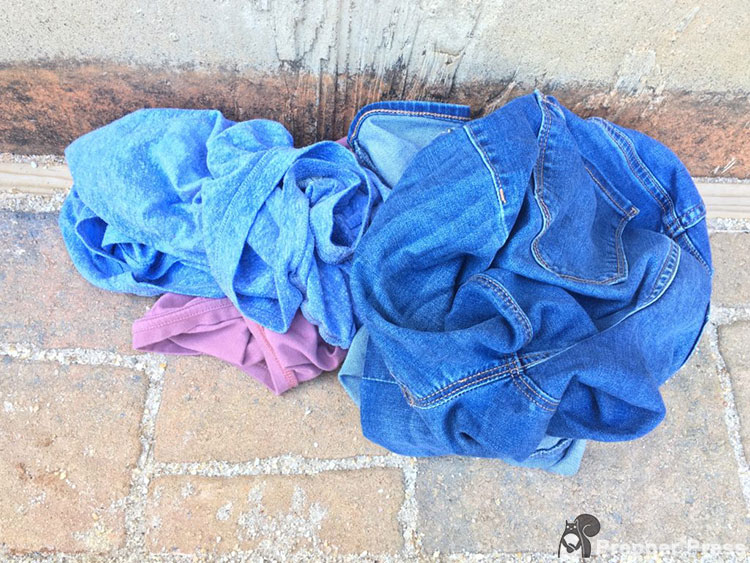
You’re going to have to do much smaller batches at a time than you would in a traditional washing machine. Really, this holds true for off grid laundering of any kind though. I found that a pair of jeans and two shirts was about the limit of what I could efficiently wash within the Scrubba.
Step 2: Shove Laundry in the Bag
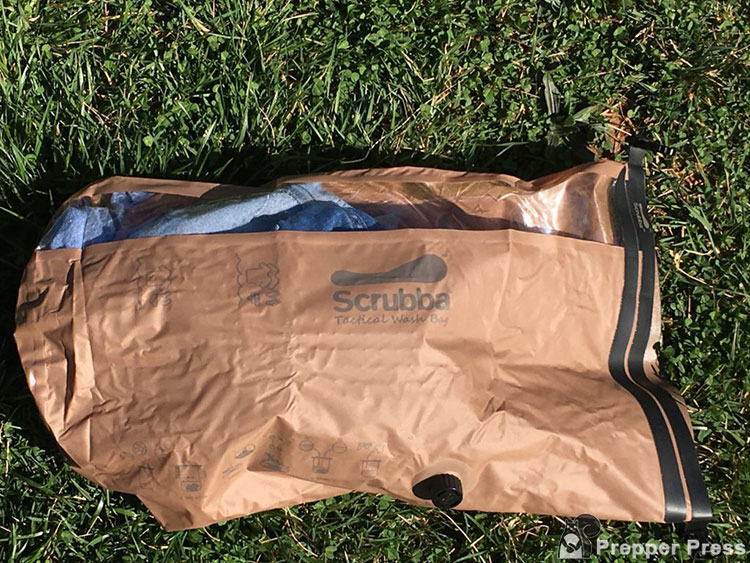
Easy peezy so far, right?
Step 3: Pour in Your Laundry Detergent
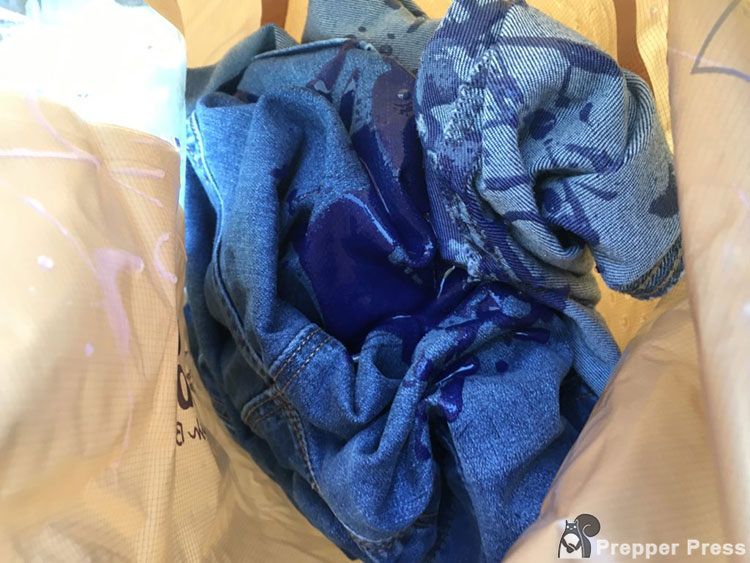
I have some handy little single use packs of laundry detergent. They’re probably around a tablespoon worth of detergent. Just squirt all that stuff in on top of your clothes.
You can also make your own detergent. More on that in a moment.
Step 4: Add Water
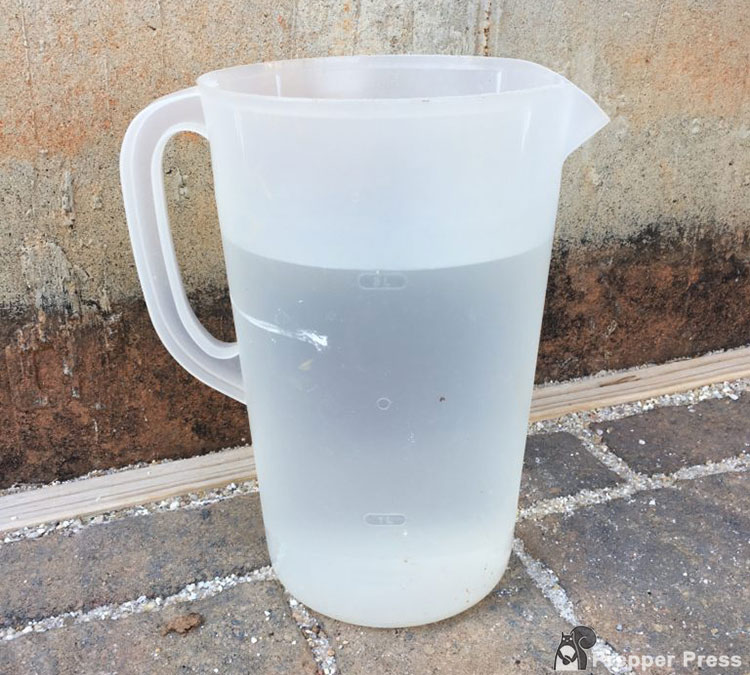
Where I live we refer to these as “Kool-Aid pitchers.” You’re going to need around one of these full of water for the washing.
Step 5: Roll Up and Clip the Bag
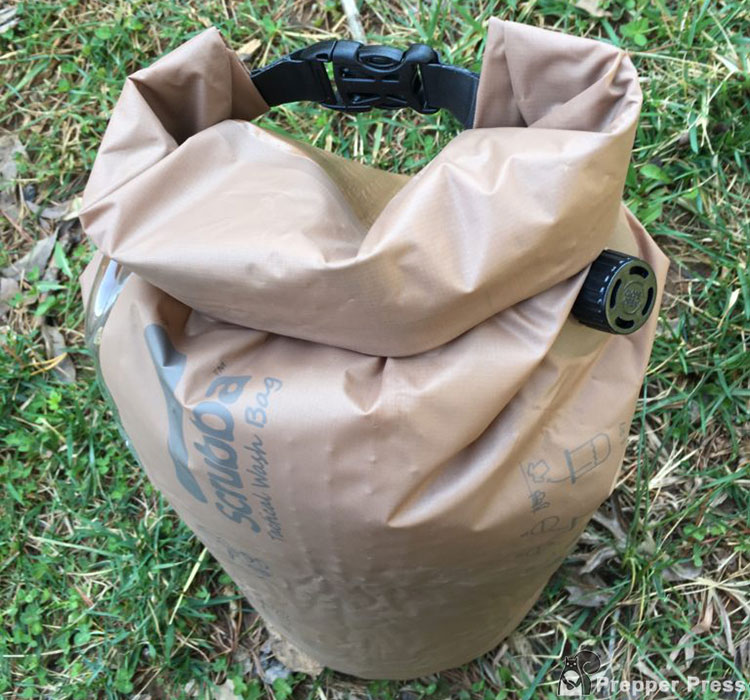
This keeps everything in place. It’s very similar to the waterproof bags that you’ve likely used for backpacking.
Step 6: Unleash the Valve and Press the Air Out
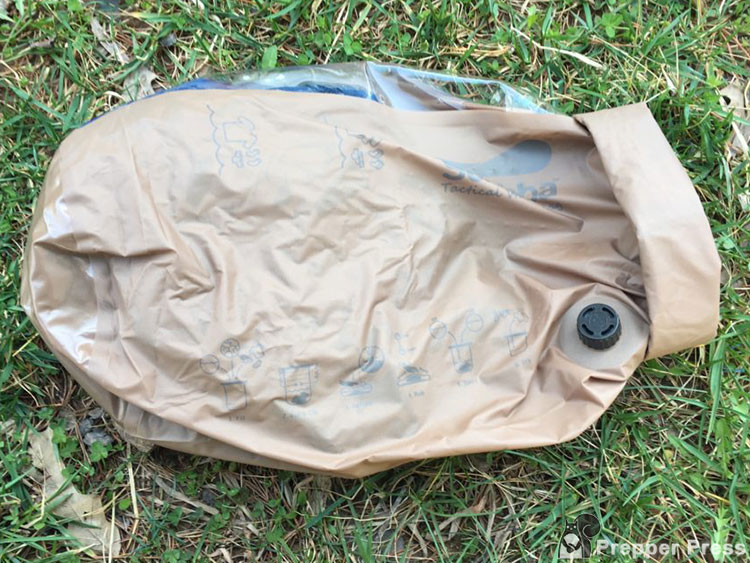
Squeezing the air out will allow you to scrub the clothes without making the bag pop.
Step 7: Scrub!
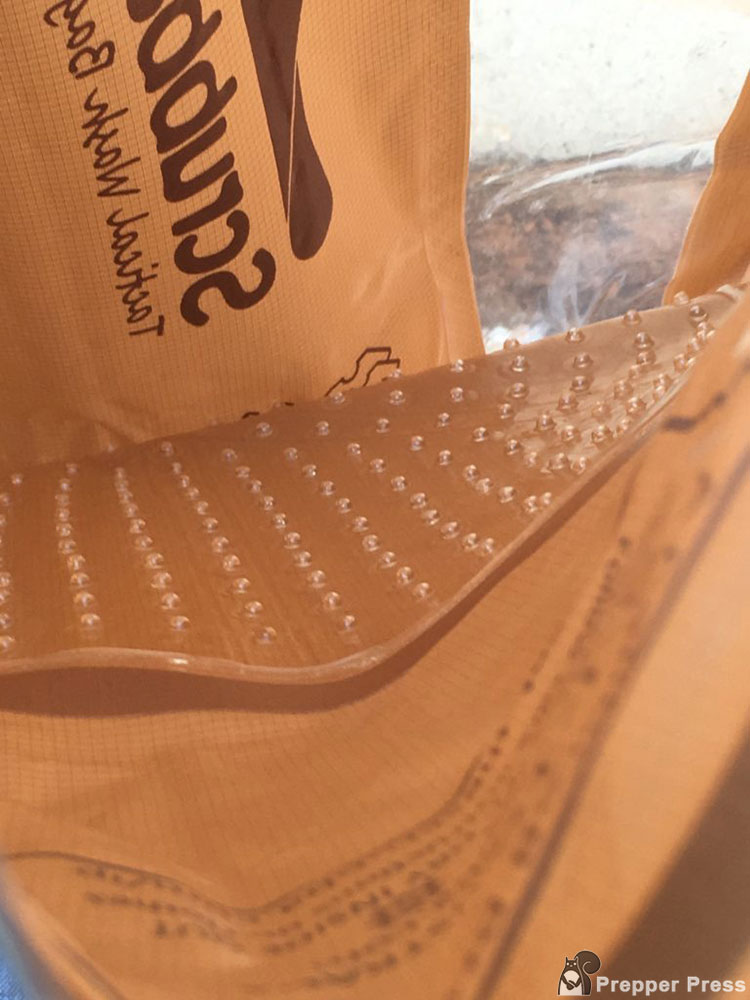
All you have to do is roll the bag back and forth with your hands, pressing the clothes against the scrubbing nodules as much as you can throughout the process. You’ll want to do this for around three minutes.
Step 8: Empty the Bag of Dirty Water and Rinse with Clean
This step is pretty self-explanatory. I added another Kool-aid pitcher’s worth of clean water, swished it around, and then dumped it out. Repeat as needed in order to get the soap out of your clothes.
- FAST & CONVENIENT: The patented washboard-in-a-bag design gives a machine quality wash in just minutes and you can wash anywhere – perfect for deployments, hotels, hostels, camping, backpacking, dorm rooms, RVs and scout trips.
- SO SMALL AND LIGHT: Weighing just 5.6 oz. and folding to pocket-size, this world’s smallest washing machine takes up no space and lets you travel clean, light and free.
Step 9: Hang Your Clothes Out to Dry!
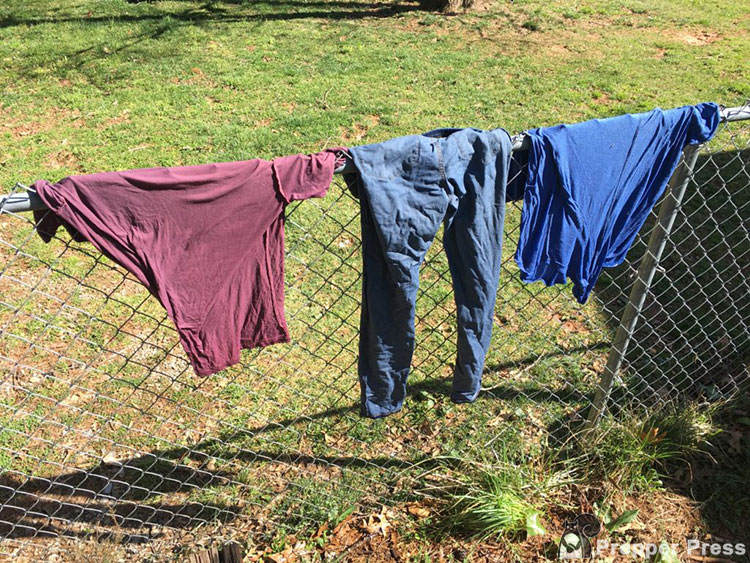
This whole process was incredibly easy and straightforward. I highly recommend doing what you can now to improve your ability to live off grid. With the widespread power outages, threat of EMP, and government threat of shutting off power to those who are non-compliant, you need to start doing what you can now to ensure that you can still operate effectively without electricity. Having a Scrubba on hand can help you on your journey to true self-sufficiency and independence.
How to Make Your Own Laundry Detergent
If you’re going to truly understand how to do off-grid laundry, you need to know how to make your own laundry detergent as well. While one could always prep pre-made laundry detergents, there may come a time and place where such are not available. If such becomes the case, or if you want to save money, don’t like some of the additives that are being placed in your laundry detergent, don’t have access to a store, or don’t like the politics of a particular brand, then making your own detergent can truly be a skill set of independence.
Let’s take a look at what this entails.
You’re going to need:
Step 1: Grate the Bar Soap
Take that bar of soap and turn it into a pile of soap shavings with a cheese grater.
Step 2: Mix Ingredients
You want to mix your laundry detergent ingredients as follows:
- 2 parts borax
- 2 parts washing soda
- 1 part soap flakes

So for ease of measuring, let’s say two cups of borax, two cups of washing soda, and one cup of soap flakes. If you mix these all together, you now have your own laundry detergent.
Don’t mix it with your bare hands though. Washing soda can be a skin irritant for some. Use some type of utensil designated for laundry detergent.
Step 3: Use it to Wash!
For every wash load, all you have to do is add three tablespoons of this detergent.
Storage tips
Just make sure that you keep your homemade laundry detergent stored in an airtight and moisture-resistant container (such as a Mason jar) so that it doesn’t degrade over time due to moisture. Exposure to such over a long period of time can result in the detergent caking and leaving soap residue on your clothes because it didn’t dissolve in the wash water as well.
Final Thoughts
Alright, so let’s break this down into one final list of things that you’re going to want to consider prepping if you’re interested in off-grid laundering. You’re going to want to consider:
- A Scrubba
- Borax
- A cheese grater
- Washing soda
- Pure bar soap
- Clothespins
- Having a clothesline set up already
If you have these items at your home, then you’re all set! You have everything that you need for off-grid laundering and are one step closer to independence from electricity, washing machines, and the laundry mat.
Post-disaster this capability (of doing laundry) The ability to wash your own clothes by hand after a disaster will matter a lot. Seeing that it’s not as fun as guns and ammo (who likes doing laundry?), this is an oft overlooked aspect of prepping. However, that by no means indicates that it is unimportant!
So do what you can now to get your family prepared so that you can still have clean clothes when others can’t. You may thank me for it later.
Are there other considerations with off-grid laundering or other tips that you’ve discovered that we didn’t cover here? Let us know in the comments below!



2 comments
Interesting article. I’d like it better if someone would write up something and how to make your own scrubber bag. Amazon is selling those for $54 which is a bit much for a bag.
Glad you shared Scrubba. I may just need to invest in one.
I currently do more laundry in two buckets with holes in one and a plunger. I also use a similar recipe for laundry soap. Scrubba may just be a bit easier in doing some laundry. I think it will be a perfect addition to the task of laundry.